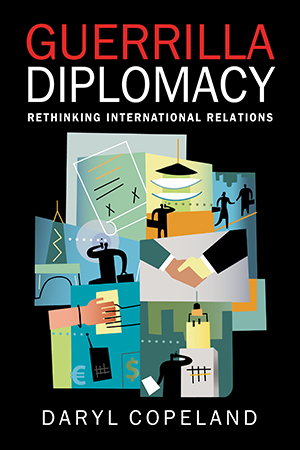Daryl Copeland charts the course for a new kind of diplomacy, one in tune with the demands of today's interconnected, technology driven world.
Eschewing platitudes and broadly rethinking issues of security and development, Copeland provides the tools needed to frame and manage issues ranging from climate change to pandemic disease to asymmetrical conflict and weapons of mass destruction. The essential keystone of his approach is the modern diplomat, able to nimbly engage with a plethora of new international actors and happier mixing with the population than mingling with colleagues inside embassy walls.
Through the lens of Guerrilla Diplomacy, Copeland offers both a call to action and an alternative approach to understanding contemporary international relations.
Daryl Copeland is research fellow at the University of Southern California's Center on Public Diplomacy and senior fellow at the University of Toronto's Munk Centre for International Studies. In
1981-2009 he served as a Canadian diplomat, with postings in Thailand, Ethiopia, New Zealand, and Malaysia, and in 1996-1999 was national program director with the Canadian Institute of International Affairs.
Visit
www.guerrilladiplomacy.com to view the author's personal website, which contains more information about his work.
"A highly readable and entertaining book [that] will be appreciated by undergraduate and graduate students alike. Practitioners may have more than quibbles with Copeland's solutions to the marginalization of diplomacy, but they are unlikely to disagree fundamentally with his diagnosis."—Evan H. Potter,
International Journal
"A rich argument spiced by Copeland's years of experience on the ground.... It puts forward an inescapable challenge with which scholars and practitioners alike will have to grapple as they attempt to define a role for diplomacy in the future of international relations."—Ali Fisher,
Journal of American Studies
"Young and aspiring diplomats should find this essential reading."—
Library Journal
"A must-read for forward-thinking diplomats."—Jeff Davis,
Embassy Magazine
"Truly enjoyable to read.... A tool for navigation through a complex and intertwined system of multiple actors, levels, and problems and a guideline for advancing the role of diplomacy in a changed world."—Katharina Höne,
DiploNews
"Thoughtful, provocative, and essential reading on the conduct of foreign policy and diplomacy in the globalized international system.... This cogent and well-directed book is linked by an underlying set of questions relating to the methods, policy role, and skills needed by a new breed of contemporary diplomat."—Ronald Barston, The Diplomatic Academy, London
"Now, when the world most needs effective diplomacy, transformation of this creaky profession is essential. Daryl Copeland's
Guerrilla Diplomacy demonstrates that he is a forceful agent of urgently needed change."—Jeremy Kinsman, Diplomat-in-Residence, Princeton University
"Copeland provides a very clear and bold blueprint—an impassioned plea, even—for the reform of diplomatic practice if it is to retain its relevance and purpose in the age of globalized relations. We will view diplomacy in a different light after this book."—Donna Lee, University of Birmingham
"We need diplomacy now more than ever, and Daryl Copeland's
Guerrilla Diplomacy shows how nimble footed all—from career diplomats to global citizens—must be in this life-saving task."—Nancy Snow, Syracuse University
"A tour de force.... Refreshing, insightful, innovative.... Finally, a new generation of diplomacy for a new generation of students of diplomacy."—R.S. Zaharna, American University
"Daryl Copeland has always been ahead of the curve. Now he has produced a seminal study on the analysis and treatment of 'global' issues from an alternative diplomatic perspective.... His work charts a new way forward for those committed to finding nonviolent solutions to the central problems of underdevelopment and insecurity."—Timothy Shaw, University of the West Indies
"Daryl Copeland's book shows how diplomats can make a distinct contribution to the literature on globalization.... His thought-provoking analysis of what he calls 'guerrilla diplomacy' and the future challenges of his profession is simply refreshing."—Jan Melissen, Netherlands Institute of International Relations
"When diplomacy's current revolution is recorded in the history books, Copeland's extraordinarily compelling and prescient work will be acknowledged as one of the milestones of this turbulent period."—Simon Anholt, UK Foreign Office Public Diplomacy Board
"Daryl Copeland's practical and stimulating propositions range across the whole spectrum of foreign policy and diplomatic practice....
Guerilla Diplomacy needs to be constantly revisited, affording new and refreshing insights as the tumultuous events of the 21st century unfold."—Sir Peter Marshall, Chairman of the Joint Commonwealth Societies’ Council
"Witty and wise and with a sobering dose of warning, Daryl Copeland has penned a masterly manual for navigating the diplomatic rapids of the twenty-first century."—Nicolas J. Cull, University of Southern California
"Provocative, thoughtful, and cutting edge,
Guerrilla Diplomacy creatively probes how diplomacy must change to be effective in a globalizing world. Copeland is an accomplished diplomat who writes from an academic perspective, which is useful and rare.... His assessment of diplomacy’s shifting center of gravity is a compelling read."—Bruce Gregory, George Washington University








